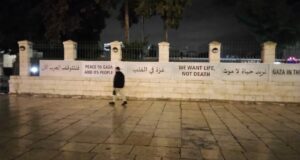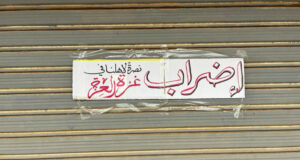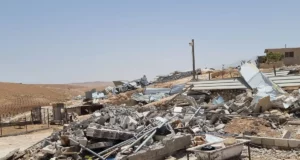by ISM Hebron, November 28th
On Sunday, at around 2:30pm, three neighborhood kids came by our place for the afternoon soccer game they’d scheduled with us. I was not planning on playing, and I am no good at soccer, but playing against 11-year-olds evens the odds a bit. So we bought two soccer balls, pumped them up, and headed straight for the flattest part of this neighborhood — Shuhada Street.
Once a lively neighborhood shopping area, Shuhada Street and the surrounding area got a lot quieter after the Baruch Goldstein massacre in 1994 *. The old city market around the corner was shut down in 1997, roadblocks were placed on Shuhada Street in 2001, and the area was finally closed by military order in 2002. At one end of Shuhada Street is the Tel Rumeida checkpoint, and at the other end is the Beit Hadassah, Jews-only settlement. Some of the houses here are, on occasion, used by the Israeli military, but many are kept empty. This place, like much of the old city, is a ghost town — even the people who live in the area don’t play or hang out here.
We didn’t even get three kicks in before Israeli soldiers told us to stop. Of course we didn’t take them too seriously at first (who the hell has a problem with soccer?) and kept on aimlessly kicking around. The soldiers got more insistent so we stopped what we were doing; as some of us moved the game to the top of very steep hill, the rest stayed to negotiate and argue. “These kids live here, and you’re telling them that they can’t play here? Where else are they supposed to play?”
To this, the soldier –an American serving in the Israeli military– responded, “For you to try to make the children play here is very irresponsible. This is seen as provocative, you know. The Jews see a crowd of Arabs and they will then throw stones, just as when Arabs see a crowd of Jews they will throw stones. My job is to keep the peace here and protect the Jews. You can go play at the top of the street.” He said this despite the fact that the soldiers regularly allow the Jewish settlers to play in their army posts at the top of Tel Rumeida street, right next to Palestinian homes.
And so began another stupid, pointless verbal confrontation.
The daily view of Shuhada street under occupation
As some human rights workers attempted to negotiate with the soldiers on the scene and their superiors on the telephone, the rest of us went to the top of the hill on Tel Rumeida Street to start a game with some teenagers. Incidentally, a couple of weeks ago, the soldiers prohibited the kids from playing at the top of the hill — exactly where they told us to go play this time. We divided into mixed groups of three for “winner stays loser leaves;” for every goal scored, the losing team would be replaced by another team; in short, each team plays until they are scored against.
With all the action up at the top of the hill, I had totally forgotten all about Shuhada street until an American human rights worker came up the street to tell us that, after 90 minutes, the DCO (District Co-ordination Office, the civilian administration wing of the Israeli military in the West Bank) verified her claim —that the kids had every right to play on their own street. At that the soldiers relented.
During this time, though, the soldiers had told the kids they couldn’t play on Shuhada street and shooed them away, so we figured that a few of us would go down and kick the ball around ourselves, so we did. After a few minutes, a couple of kids approached —with some noticeable trepidation– and joined in. Bit by bit, the Shuhada street kids, after seeing that it was okay to play here, came out of their houses and joined in. Bit by bit, passers-by stopped to crack a smile and maybe even kick a ball.
Within 15 minutes the neighborhood kids from this block were doing something they haven’t done in AGES — playing on their own streets. It may have taken a bunch of pushy internationals with cell phones to get a green light, but it took the Shuhada street kids to transform their neighborhood from a militarized ghost town into the best soccer field in Hebron.
Goal after goal under a setting sun, I saw six soldiers watching the game from their checkpoint and thought, “how could anyone see anything wrong in what these kids are doing?” I hope that some hearts were touched — I can’t imagine how anyone could find fault with what they tried to stop, and I never will. Maybe the soldiers looked down the street and thought, “man, those kids have every right to be here, and we were wrong to stop it.” Maybe they looked down Shuhada Street and saw something beautiful.
* Baruch Goldstein was a Jewish fundamentalist settler from America who in 1994 killed 29 Palestinians at prayer in the Ibrahimi mosque in Hebron.
 International Solidarity Movement Nonviolence. Justice. Freedom.
International Solidarity Movement Nonviolence. Justice. Freedom.



